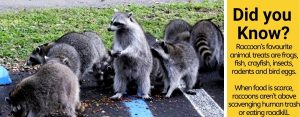

Healthy raccoons do not usually make a lot of noise when they’re alone - in fact lone raccoons are usually fairly quiet.

Healthy raccoons produce these vocalizations in the presence of other raccoons during normal interactions such as fighting or mating. While this can be similar to the noises made by a healthy raccoon, it’s sometimes possible to differentiate between the two. A rabid raccoon will produces different noises from their healthy counterparts.Īn infected raccoon might squeal, screech, and hiss.
#DO RACCOONS GROWL AND HISS HOW TO#
It’s important to know how to distinguish them from uninfected raccoons by the sounds they make. For example, as they make their way across your roof, through the inside of your walls, or up into your chimney.īecause raccoons are primary carriers of rabies, an infected raccoon is very dangerous. Raccoons can weight between 10 to 15 pounds and their slow and plodding movement can produce dragging sounds. Scratching sounds may also be heard as raccoons try to climb down your pipes or up your counters and cabinets if they find a way inside. You might hear these clever creatures scratching in between your walls or crawlspace. Similarly, raccoons produce scratching sounds as they move around in different areas of your house. If they gain entry, you might also hear them rustling around your home, brushing up against wood beams in your attic or inside your walls tearing up insulation. You might hear rustling when raccoons are foraging for food, for example in garbage cans and bins. The most common movement-related sounds you might hear are rustling, scratching, or dragging. While raccoons make a variety of vocalizations, they also make noise when they move around. What do Raccoons Sound like when they Move? Raccoons can also chitter when they come across each other while searching for food, in resting places, or while just moving about. Adult raccoons chitter when they are interacting with other raccoons, and cubs chitter when approaching or calling for their mother. Chittering has several variations and is used by raccoons in different contexts. One of the most common vocalizations that raccoons make is a chittering sound. What Types of Sounds do Raccoons Make? Chittering On top of vocalizations, raccoons also create different sounds as they move around.

These mammals can make over 200 sounds that indicate whether they’re communicating with each other, searching for food and shelter, fighting with other raccoons, or defending their young. This is why it’s important to know the different sounds and noises raccoons make.įun Fact: Raccoons are extremely vocal animals. But while you might not see them, you just might hear them. However, since people can’t see as well at night, it’s more difficult to know for sure whether you have raccoons. Since they are nocturnal creatures, raccoons are most active at night - as soon as the sun sets, they leave their dens in search of food. If you’re hearing indiscernible animal sounds at night, there’s a possibility that there are raccoons near your house or property.


 0 kommentar(er)
0 kommentar(er)
